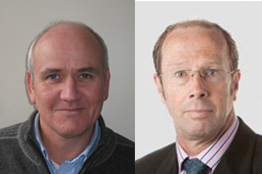
Hatchtech CSO and CEO - Dr Vern Bowles (L) and Dr Ross Macdonald (R)
Australia-based Hatchtech, which was started in October 2001, is developing a new generation of low-toxicity ovacides for human parasites, focussing on the human head lice and also on the agricultural applications of the technology. Hatchtech's key product is DeOvo, is a cosmetically elegant topical lotion containing an inhibitor of metalloproteases that are known to impede all stages of the louse lifecycle from egg-to-adult. in a single application.
While other head lice solutions treat the lice, few are highly effective against the eggs and hence repeat applications are needed to eliminate an infestation. In addition, while head lice have developed resistance across the world to many of the available products, Hatchtech's product DeOvo has a novel mode of action as compared to other current active ingredients. This means that there is no known cross resistance with DeOvo.
Birth of Hatchtech
Hatchtech was established to build on the research of Dr Vern Bowles, the chief scientific officer (CSO) of Hatchtech, showing that proteases are involved in egg hatching and survival in parasitic insect pests. The potential commercial applications were very broad, covering both human healthcare as well as agricultural and veterinary fields and thus the formation of a company was ideal for the development of a product. Proof-of-principle was initially obtained in a veterinary agricultural pest and based on the success of this early work, Hatchtech was established.
Hatchtech is securely financed by a consortium of specialist venture capitalists and is located in Melbourne, Australia. Until date the company has attracted around A$14 million in venture capital funding, and another grant worth close to A$3 million. Dr Vern Bowles, CSO; Hatchtech, while speaking about the firm's funding scenario said that, " One of our major milestones is related to raising the required capital when needed to ensure that the company has the funds to continue operating. This has been addressed by Hatchtech by meeting the required technical milestones in the appropriate time frames."
Hatchtech presently outsources most of its administrative support and clinical, regulatory and manufacturing requirements. Whilst this is often a challenge for companies with multiple product candidates and complex regulatory paths, it is much more feasible for Hatchtech in view of the particular commercial application being pursued by the company. "We have largely undertaken our product research internally though our association with the University of Melbourne, where our CSO Dr Vern Bowles has an adjunct associate professorship," added Dr Macdonald.
Clinical trials
DeOvo successfully completed a phase IIb clinical trial under an IND with the US FDA and is poised to poised to begin phase 3 clinical studies with potential approval in the US in late 2014 or early 2015.
Other potential commercial applications will also be investigated by Hatchtech. The protected methodologies of Hatchtech involve identification and selective inhibition of key processes involved in egg hatching.
Market Demand
Hatchtech's novel head lice product is expected to sell like hotcakes. The demand for such products is evident from the fact that the market for prescription lousicides in the US alone is around $90 million, with over-the-counter (OTC) product sales being around the same amount.
Dr Ross Macdonald, CEO, Hatchtech, while speaking about the market demand said that, "We believe that the human head lice market is in great need of an effective ovicide and adulticide. We have focused our efforts on head lice and at this stage have not explored in any detail the opportunity against other human parasites."
Dr Macdonald expects the growth in the head lice market to come from several areas. He feels that emerging markets will be a major driving force as there is a decreasing tacit acceptance of head lice infestation in these markets. He also expects market growth to come from a migration of patients and consumers from ineffective OTC products to highly effective prescription products such as DeOvo. "This is driven in part by the well documented resistance of head lice to most active agents available OTC," he said. Furthermore, it is expected that doctors will increase their prescribing rate of the newer and more effective prescription products.
Challenges and future plans
Major challenges of the firm have been associated with the technical aspects of bringing a new chemical entity through a comprehensive preclinical and clinical program. This has been addressed by seeking out expert individuals and organisations with experience in the relevant areas. The other key challenge has been commercial, associated with raising sufficient capital to enable the R&D program to be undertaken.
Dr Vern Bowles, CSO; Hatchtech, said that, "The issue of funding has been addressed by attracting sophisticated investors into the company and also through attracting additional funding as provided by the Commonwealth Government through the ARC and through various AusIndustry programs."
Future plans of Hatchtech are to realize the investment from the head lice business. The company plans to achieve this by using a number of mechanisms including a trade sale, a licensing arrangement of the technology to a third party, or building a sales and marketing enterprise. Moreover, Hatchtech is also interested in using its technology to explore other human parasites such as scabies and several other possible veterinary applications in the future.




